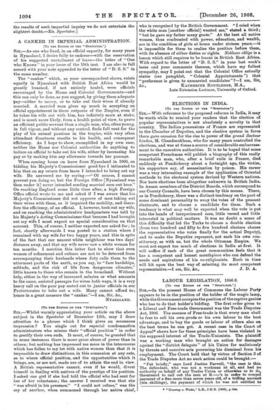MO THE EDITOR OF TRI: "SP/CfrTATOR."J
SIR,—Whilst warmly appreciating your article on the above subject in the Spectator of December 12th, may I draw attention to a phrase which I think gives an erroneous impression ? You single out for especial condemnation administrators who misuse their "official position" in order to gratify their own ends. It must, of course, be granted that in some instances there is more gross abuse of power than in others; but nothing has impressed me more in the intercourse which has fallen to my la with native women than that it is impossible to draw distinctions, in this connexion at any rate, as to where official position, and the opportunities which it brings, are, or are not, made use of to attain the end in view. A British representative cannot, even if he would, divest himself in dealing with natives of the prestige of his position. I asked one girl if she had told the official who had sent for her of her reluctance; the answer I received was that she "was afraid in his presence." "I could not refuse," was the cry of another, when summoned through her native chief, who is recognised by the British Government. "I cried when the white man [another official] wanted me," stated a third; "but he gave my father many goats." At the best all native women, thus confronted with power, education, and wealth, are in the condition of girls at home under sixteen years,—it is impossible for them to realise the position before them, with its absence of either duties or rights. Noblesse oblige is a lesson which still requires to be learnt in British East Africa. With regard to the letter of "D. S. S." in your last week's issue and your comments thereon, which have my fullest sympathy, may I point out that the Colonial Office actually states (see pamphlet, "Colonial Appointments '') that "preference is given to unmarried candidates" ?—I am, Sir, KATHERINE ROITTLEDGE, MA.,
Late Extension Lecturer, University of Oxford.






































 Previous page
Previous page